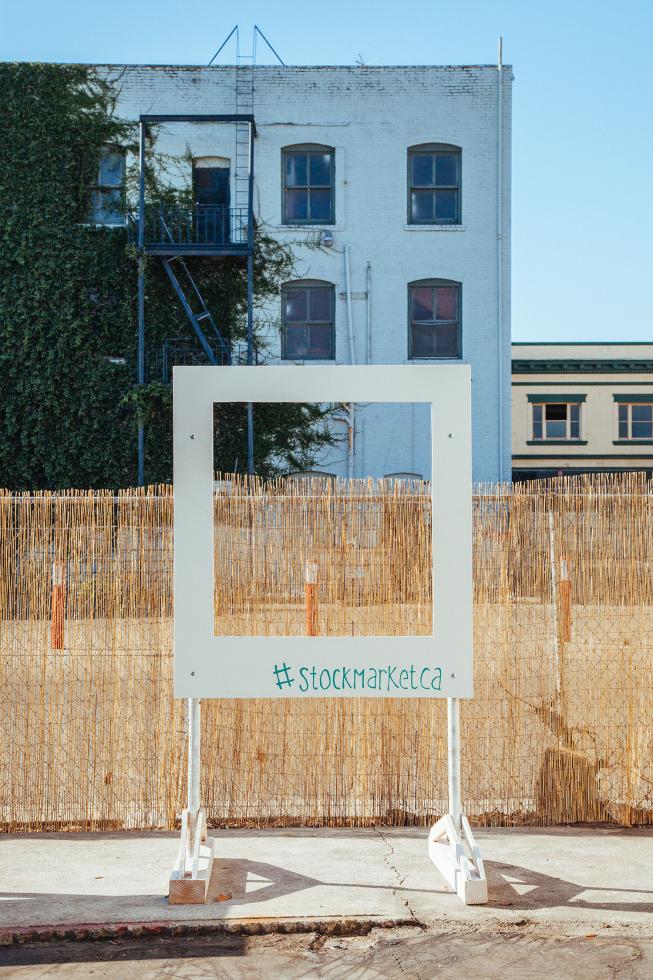Amy Sieffert, a Stockton native, has been running a vintage clothing business called Something Borrowed since 2010 — but she had to leave her hometown to make a profit. On weekends, she would travel to Sacramento and the Bay Area because there were no local makers markets where she lived. To help turn this ghost town into a local hotspot, Sieffert and business partner Katie Macrae created the Stockmarket, a seasonal market that showcases Central Valley artisans.
On May 2, shoppers flocked to East Weber Avenue to experience the inaugural event. Live bands played bluegrass and country music. Food trucks served Korean-fusion dishes, Cuban cuisine and gourmet meatball sliders. More than 40 vendors were there to sell their specialty wares: art prints, hand-poured candles, handmade jewelry, vintage clothing, leather goods and suitcases-turned-speakers.
“This was the hub when Stockton first came about in the early half of last century, but I don’t know what happened,” Sieffert says of downtown. “It’s been empty for a while now.”
And it’s not just long-term natives that see what Sieffert sees. Macrae, who moved to San Joaquin County from Australia (by way of England), says, “It’s not often that lots of people are on the eastside of downtown Stockton on the weekend. It’s normally a ghost town.”
With the Stockmarket, the duo hopes to pump life back into the area, where work traffic flows on weekdays but dries up after 5:00 p.m. and on weekends. Revitalization won’t happen overnight, especially when the outward migration has been in effect for decades, says Cindi Fargo, CEO of Downtown Stockton Alliance, a property and business improvement district formed in the late 1990s.
Downtown Stockton used to be a thriving business district, bustling with restaurants, retail and activity centers. But like other cities in the country, Stockton felt the burn when suburban development of farmland pushed residents to the fringes.
“Starting in 2007, it was a bumpy ride for downtown Stockton,” Fargo says. “We had the real estate and financial crisis in the community at large, bankruptcy underway, and issues with crime and perception of crime created a perfect storm.”
In 2010, the city also lost redevelopment funds, which meant the private sector had to step up if the area had any chance of reliving its glory days. The efforts to revitalize are ongoing, Fargo says, but festivals, celebrations and events like the Stockmarket are invaluable when it comes to influencing current residents to come downtown, encouraging visitors to stay longer and rebuilding downtown Stockton as a destination.
As a Stockmarket sponsor, DSA underwrote the event with $2,000 towards verified expenses, provided staff and equipment and helped with marketing. Judging from an in-house survey, the event garnered a good amount of local support:
- 65 percent of attendees were from Stockton
- 81 percent were extremely happy with event
- 100 percent of respondents said they would recommend the event to a friend
One attendee wrote: I’m originally from Stockton (and will be moving back next month), so I was very excited to see the downtown area being revitalized! I was also happy to be able to buy some great things from local shops and artists -— I love to support local!
Other respondents shared their appreciation for the overall vibe and diverse crowd. Another wished the event was held regularly once a month. For now, the Stockmarket will be held every other month (May through December) with the next one slated for July 18.
With this market now up and running, Sieffert plans to cut down on her weekend business trips to neighboring cities. She prefers to keep it local.
“We need people to stay here and believe in it and work at it to make downtown Stockton what it once was,” she says. “I’d rather keep my business local and build up our economy and provide a platform for other small businesses.”




